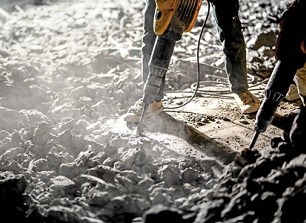When to make an industrial deafness claim
We’ve reached a point in time where people who have worked in noisy environments before hearing protection was a requirement are starting to retire, and are thinking about whether they can still do anything about the hearing that they lost those years ago.
Sounds just aren’t as clear as they used to be. What once was clear speech is drowned out in the background noise of bustling crowds or busy traffic. You find yourself constantly asking people to repeat themselves, and you try to read their lips so you can figure out what they just tried to tell you. Maybe your wife gets annoyed at how loud you keep the television. And there’s that ringing in your ears that doesn’t go away.
If you’ve worked in a noisy environment, then you may have suffered from industrial deafness. Were there loud vehicles or engines that you spent a lot of time around? Did your work day place you around clanging factory machinery? Did you work in construction sites with jackhammers, or excavators, or drills? Or perhaps the ear muffs didn’t do much to filter the noise, or you couldn’t wear them because you needed to hear something important. Or maybe they never gave you ear muffs at all.
You may be eligible to receive treatment for you hearing loss under the Workers’ compensation scheme. While hearing loss is mostly irreversible, you could be entitled to hearing aids, and in worse cases of hearing loss, compensation for permanent impairment (when you have suffered over 20.5% binaural hearing impairment). Under the Workers’ Compensation Act 1987, your last noisy employer may be liable to compensate you for your hearing loss.
But what if my last noisy employer was years and years ago, and they no longer exist?
As long as your employer took out Workers’ Compensation insurance, then it is as simple as notifying that insurance company of your injury. And even when there are no records of insurance from back then, our Personal Injury team has plenty of experience in dealing with exactly that, to make sure you do receive compensation for your injury.
What will an industrial deafness claim cost me?
In most cases, you should also be eligible to apply to have the entirety of your claim with us funded by the Workers Compensation Independent Review Office (“WIRO”). This would mean you would not have to pay any legal fees or disbursements. You can find more information on our Industrial Deafness Claims page.
What happens next?
We will then book an appointment for you to see an audiologist for an initial assessment of your hearing loss. We will also book you in to see and an Ear, Nose, and Throat specialist (“ENT”), who will examine your hearing to determine how much of it came from your noisy employment. Based on the ENT report, we will then make a claim against your last noisy employer for industrial deafness, who will usually forward it to their Workers Compensation insurer, who will investigate and determine your employer’s liability for your industrial deafness.
